
Wiki / Humiliation
Inhaltsverzeichnis: (verbergen)
 Am Pranger – Neuzeitliche Nachstellung |
|
It has always been a mystery to me how |
Personal avowals
Public slut-shaming worldwide pushed Lewinsky to the brink of death – compassion helped her out of the shame trap.
1976 – 90% of American women have experienced sexual harrassment in the workplace. 2017 – 80% of American women have experienced sexual harrassment in the workplace.
Recommendations
Appeals
All humans and societies are vulnerable and imperfect. In cruel societies missing out on human dignity vulnerability is seen as weakness, imperfection is seen as inadequacy. Many humans buy into the idea to be "less than", not worthy of belonging.
Conclusions
Insights
Unhealthy behaviors: undue fear, bullying, silencing of cautionary or creative voices, cliques, factionalizing, bootlicking, backbiting, gossiping, undermining, sabotage


|
Literary quotes
Persönliches Bekenntnis
Weltöffentliche Schlampen-Beschämung trieb M. Lewinsky an den Rand des Todes. Mitgefühl half ihr aus der Schamfalle heraus.
|
Personal avowals
Persönliche Bekenntnisse
| ||||||||||||||||||||||||||||||||||||||||||
| See also: ► Three historic periods of human development including two normative turning points – Evelin Lindner |
| |||||||||||||||||||||||||||||||||||||||||||||||||||||||||||||||||||||
| See also: ► Dignity |
|
| |||||||||||||||||||||||||||||
|
| Source: ► Evelin Gerda Lindner, M.D., Ph.D. (*1954) German physician, psychologist, transdisciplinary scholar in social sciences and humanities, human dignity researcher, founding president of Human Dignity and Humiliation Studies (HumanDHS), author, Emotion and Conflict. How Human Rights Can Dignify Emotion and Help Us Wage Good Conflict, Introduction, S. xx-xxi, Praeger Publishers, 2009 |
| See also: ► Reconciliation between Hercules and Hydra – a healing story |
| |||||||||||||||||||||||||||||||||||||||||||
| References: ► Adolf Hitler [Führer und Reichskanzler] (1889-1945) Austrian-German fascist leader of the Nazi Party during the Third Reich (1933-1945), Mein Kampf, [1925-1926] Pimlico, London, 1939, 1998 ► Nelson Mandela (1918-2013) leading South African anti-apartheid activist, prisoner for 27 years during apartheid, first black president of South Africa (1994-1999), Long Walk to Freedom. The Autobiography of Nelson Mandela, Little, Brown and Company, London, 1994, Back Bay Books, 2. June 2008 ► Nelson Mandela (1918-2013) leading South African anti-apartheid activist, prisoner for 27 years during apartheid, first black president of South Africa (1994-1999), Welcome to Robben Island, in: Fredrik S. Heffermehl, Peace Is Possible, S. 35 (87-89), International Peace Bureau (IPB), Geneva, Switzerland, supported by UNESCO, 2001 |
| See also: ► Correlated typology chart |
|
| Adapted from source: ► Article by Dennis R. Smith, Ph.D. (†2024) British sociologist, Organisations and Humiliation. Looking Beyond Elias, presented by the peer-reviewed academic journal Organization, issue 8, No. 3, S. 543, 2001 |
| See also: ► Trauma and ► Principle 3:1 and ► Dignity |
| |||||||||||||||||||||||||||||||||||||||||||||
| Source: ► Article The Worst Government Experiments Carried Out On Humans, presented by the controversial online outlet The People's Voice, Health, Jacqui Deevoy, 6. February 2015 |
| Reference: ► Article Go See The Report, Then Let’s Put Torture to Bed For Good, presented by the publication Just Security, Sondra Crosby, retired Brig. General, David R. Irvine, Christian Meissner, Scott Roehm, 14. November 2019 |
| Reference: en.Wikipedia entry ► Human experimentation |
Gewalt – Violence
Links on the topic Humiliation / ErniedrigungLiterature (engl.)
Tracing the historical impact of polarized thinking from ancient Greece and Rome down to Hitler, Stalin and Bush. The damage and destruction Literatur
Eine Kränkung ist eine nachhaltige Erschütterung des Selbst und seiner Werte. Sie macht krank, führt in die Krise, und in unbewältigter Form zu Gewalttaten gegen sich und andere. Die Gesellschaft wird narzisstischer, empfindlicher und daher kränkbarer (Chronische Verbitterung).
250 Jahre Geschichte der öffentlichen Herabwürdigungen (Verletzung der Menschenwürde) in Kindererziehung, Strafrecht, Diplomatie und Politik – mutiert in den Internet-Pranger.
External web links (engl.)
The brain doesn't distinguish between physical pain and intense emotional pain. A study conducted by Ethan Kross, Ph.D., deptartment of psychology, University of Michigan, Ann Arbor, Michigan confirmed that heartache and breakups are not allegorical pains, but real pains.
Linkless articles
Externe Weblinks
Audio and video links (engl.)
Infos on narcissistic abuse by narcissists and psychopaths: Narcissistic Abuse Malignant Self-love: Narcissism Revisited, Healthyplace.com
For the last seven years, Boddy has studied the evidence and effects of toxic leadership, and the social influence of the presence of corporate psychopaths on various workplace outcomes, including on levels of conflict and bullying at work. In Australia psychopaths are responsible for
Audio- und Videolinks
Kränkung (offense) ist ein Angriff auf persönliche Werte, Gefühle und Vorstellungen, eine psychische Verletzung. Sie führt zu einer "anhaltenden Erschütterung des Selbst und seiner Werte".
|
Englisch Wiki
Hawkins
1 The Olympic Games motto "Citius, Altius, Fortius" [Latin] was proposed by Pierre de Coubertin on the creation of the International Olympic Committee in 1894. ⇑
2 "Somebody, after all, had to make a start. What we wrote and said is also believed by many others. They just don't dare express themselves as we did." Sophie Scholl (1921-1943) German student, revolutionary of the non-violent resistance group White Rose in Nazi Germany, convicted of high treason and executed by guillotine, 1943, statement to the People's Court (Volksgerichtshof) presided by Roland Freisler (1893-1945) Nazi lawyer and judge, state secretary of the Reich Ministry of Justice, 21. February 1943 ⇑
3 Michael Jesse Battle, Reconciliation. The Ubuntu Theology of Desmond Tutu, Pilgrim Press, Cleveland, Ohio, 1997 ⇑
4 Nelson Rolihlahla Mandela, Welcome to Robben Island, in: Fredrik S. Heffermehl, Peace Is Possible, S. 35 (87-89), International Peace Bureau (IPB), Geneva, Switzerland, supported by UNESCO, 2001 ⇑
5 Eilert Sundt lecture by Thomas J. Scheff, researcher on the sociology of emotions, Emotions and Politics, University of Oslo, Oslo, Norway, 24. October 2002 ⇑
6 Annie Jacobsen, US American investigative journalist, author, Pulitzer Prize finalist in history, 2016, Operation Paperclip. The Secret Intelligence Program to Bring Nazi Scientists to America, Little, Brown and Company, new edition 11. February 2014 ⇑